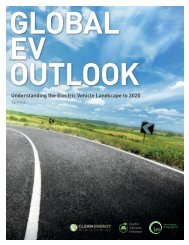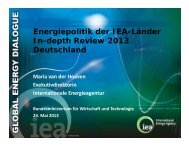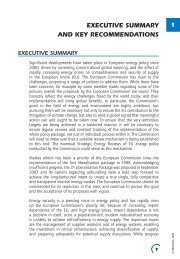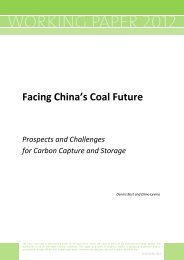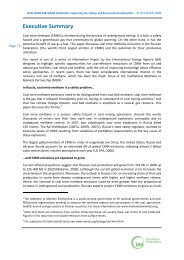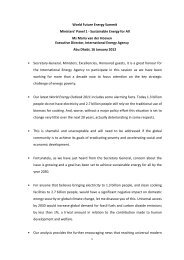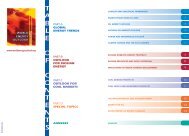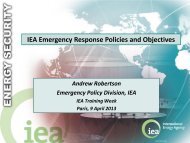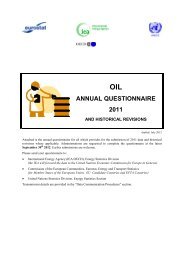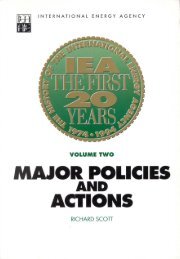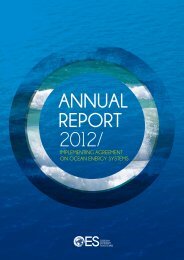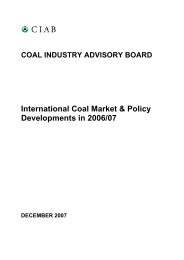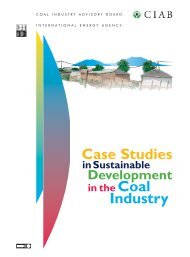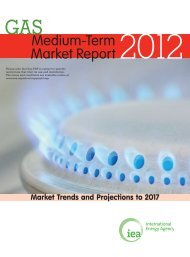Introduction by Ms. Maria VAN DER HOEVEN - IEA
Introduction by Ms. Maria VAN DER HOEVEN - IEA
Introduction by Ms. Maria VAN DER HOEVEN - IEA
You also want an ePaper? Increase the reach of your titles
YUMPU automatically turns print PDFs into web optimized ePapers that Google loves.
<strong>IEA</strong> Unconventional Gas Forum Opening Remarks<br />
<strong>Maria</strong> van der Hoeven, 22 March 2013<br />
Ladies and Gentlemen, welcome to this inaugural meeting of the <strong>IEA</strong> Unconventional Gas Forum.<br />
This forum is a global endeavour, and so I want to extend a special thanks to those travelling from<br />
non-<strong>IEA</strong> member countries: Algeria, Brazil, China, Estonia, India, Indonesia, Lithuania, Mexico,<br />
Romania, Russia, South Africa and Ukraine.<br />
The unconventional gas revolution has been one of the spectacular energy stories of recent times,<br />
and amounts to what we have called a “quiet revolution”.<br />
It has also been one that the <strong>IEA</strong> has followed and analyzed for years. In the 2009 World Energy<br />
Outlook (WEO) we already identified unconventional gas as a game changer in North America and<br />
elsewhere.<br />
Indeed, the impacts in North America over just a few years have been truly remarkable.<br />
Greenhouse gas emissions from the power sector are down; low natural gas prices are boosting<br />
industrial competitiveness; and the sector has created thousands of jobs.<br />
In 2011 we published a WEO special report on the prospects for a Golden Age of Gas, as the<br />
unconventional gas revolution begins to spread to other parts of the world.<br />
But the continuation of that revolution cannot be taken for granted, and in another WEO special<br />
report last year we outlined 7 Golden Rules for managing unconventional gas production, to help<br />
maintain the “social license” for that revolution to continue.<br />
They are based in principles and best-practices among governments, industry, and other<br />
stakeholders to manage a revolution that is likely to become much less quiet and more challenging<br />
going forward.<br />
Globally, the public is becoming increasingly aware and potentially concerned about fracking and the<br />
like, which clearly and rightfully highlights the need for open, frank and factual debate about<br />
unconventional gas.<br />
This forum is a product of that same endeavour. We wanted to create it as we seek to operationalise<br />
those Golden Rules, <strong>by</strong> allowing stakeholders from around the globe to share and discuss insights,<br />
best practices, and regulatory ideas.<br />
Unconventional gas is still a very regionally specific phenomenon, and so it makes sense for those<br />
with a great deal of experience to share the fruits of that experience with those who are looking to<br />
emulate the unconventional revolution.
This is our way of encouraging the Golden Rules, and other effective principles, to move off the<br />
drawing board and beyond a few markets, to all those who hope to see in a Golden Age of Gas.<br />
And it is extremely encouraging to have participation from such a wide variety of stakeholders,<br />
including international organisations, associations, industry, NGO’s and investors.<br />
The principles which should guide this forum – inclusion, transparency, and frank exchange – are the<br />
same ones which must guide the wider political and public dialogue about unconventional<br />
extraction.<br />
Friends, let me then welcome you again to Paris, to the <strong>IEA</strong>, and to this forum.<br />
I will now turn over to Fatih Birol, <strong>IEA</strong> Chief Economist and lead author of the <strong>IEA</strong> Golden Rules, who<br />
will explain in more detail today’s meeting.



